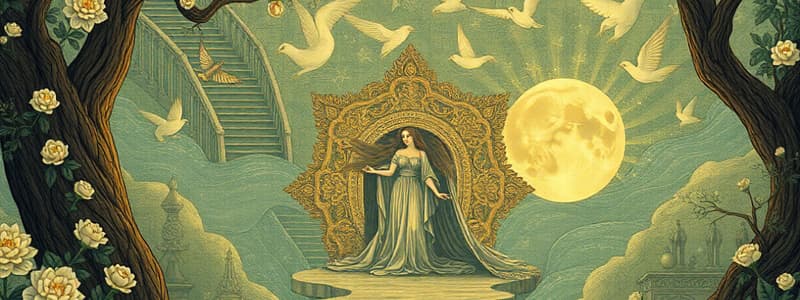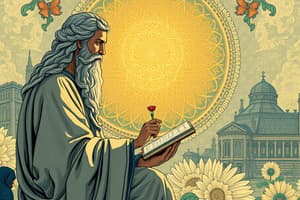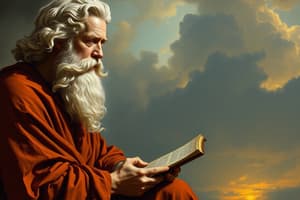Podcast
Questions and Answers
What is one of Socrates's main critiques of representational art according to his moral perspective?
What is one of Socrates's main critiques of representational art according to his moral perspective?
- It promotes emotional responses that lead to moral growth.
- It helps in distinguishing between good and bad.
- It encourages the imitation of vice rather than virtue. (correct)
- It provides a clear understanding of the truth.
The Myth of Er emphasizes that living justly leads to moral ambiguity.
The Myth of Er emphasizes that living justly leads to moral ambiguity.
False (B)
According to Aristotle, what is one key characteristic of a good tragedy?
According to Aristotle, what is one key characteristic of a good tragedy?
A coherent and complete plot.
According to Socrates, art is a copy of a copy, which is known as _____.
According to Socrates, art is a copy of a copy, which is known as _____.
What emotional responses does tragedy aim to evoke in its audience?
What emotional responses does tragedy aim to evoke in its audience?
Match the following concepts to their corresponding descriptions:
Match the following concepts to their corresponding descriptions:
The myth symbolizes the importance of virtuous choices and their impact on the soul's _____ journey.
The myth symbolizes the importance of virtuous choices and their impact on the soul's _____ journey.
What is the effect of encountering tragedy according to Aristotle?
What is the effect of encountering tragedy according to Aristotle?
Which aspect of tragedy does Aristotle consider to be secondary due to its lack of contribution to plot or moral depth?
Which aspect of tragedy does Aristotle consider to be secondary due to its lack of contribution to plot or moral depth?
Christine de Pizan’s study serves as a site of liberation that engages with societal structures for women's empowerment.
Christine de Pizan’s study serves as a site of liberation that engages with societal structures for women's empowerment.
What is Reason's advice regarding poets like Ovid in the City of Ladies?
What is Reason's advice regarding poets like Ovid in the City of Ladies?
Du Bellay idealizes ________ as the universal model for languages.
Du Bellay idealizes ________ as the universal model for languages.
Match the following terms with their descriptions:
Match the following terms with their descriptions:
What key value does Sidney attribute to poetry compared to history?
What key value does Sidney attribute to poetry compared to history?
Sidney argues that poetry teaches through theoretical concepts.
Sidney argues that poetry teaches through theoretical concepts.
What is the problem Du Bellay associates with linguistic multiplicity?
What is the problem Du Bellay associates with linguistic multiplicity?
Eve is not seen as ________, but rather as an equal partner created alongside Adam.
Eve is not seen as ________, but rather as an equal partner created alongside Adam.
Match the following works/ideas to their respective authors:
Match the following works/ideas to their respective authors:
What does Sidney argue poetry uniquely imparts?
What does Sidney argue poetry uniquely imparts?
Du Bellay claims that no language requires refinement to become literary.
Du Bellay claims that no language requires refinement to become literary.
What is Aristotle's view on song in the context of tragedy?
What is Aristotle's view on song in the context of tragedy?
Christine de Pizan builds the City of Ladies to shelter and ________ women from historical misogyny.
Christine de Pizan builds the City of Ladies to shelter and ________ women from historical misogyny.
According to Wordsworth, what is the primary function of poetry?
According to Wordsworth, what is the primary function of poetry?
Wordsworth advocates for the use of overly ornate language in poetry.
Wordsworth advocates for the use of overly ornate language in poetry.
What does Matthew Arnold mean by 'sweetness and light'?
What does Matthew Arnold mean by 'sweetness and light'?
Arnold claimed that he was saved from the 'common sense' of Benjamin Franklin through his engagement with __________.
Arnold claimed that he was saved from the 'common sense' of Benjamin Franklin through his engagement with __________.
Match the following poets or theorists with their ideas:
Match the following poets or theorists with their ideas:
What does Auerbach mean when he states, 'Homer knows no background'?
What does Auerbach mean when he states, 'Homer knows no background'?
Auerbach contrasts the narrative style of the Old Testament with that of Homer.
Auerbach contrasts the narrative style of the Old Testament with that of Homer.
According to Arnold, what role does culture play in society?
According to Arnold, what role does culture play in society?
In Genesis 22, the emotional depth is conveyed through __________ and the sparse narrative style.
In Genesis 22, the emotional depth is conveyed through __________ and the sparse narrative style.
What type of language does Wordsworth believe should be used in poetry?
What type of language does Wordsworth believe should be used in poetry?
Levi uses the myth of Ulysses to reflect solely on human resilience in Auschwitz.
Levi uses the myth of Ulysses to reflect solely on human resilience in Auschwitz.
What does Auerbach argue regarding Homer’s narrative style?
What does Auerbach argue regarding Homer’s narrative style?
Paul Alpers uses Levi's reference to Ulysses to challenge the traditional view of __________.
Paul Alpers uses Levi's reference to Ulysses to challenge the traditional view of __________.
Match the following themes with their corresponding authors:
Match the following themes with their corresponding authors:
Flashcards
Socrates's Critique of Art (Moral)
Socrates's Critique of Art (Moral)
Representational art and literature mislead the soul by promoting false beliefs, emotional responses, and immoral behaviors. It blurs the distinction between good and bad, encouraging vice over virtue.
Socrates's Critique of Art (Epistemological)
Socrates's Critique of Art (Epistemological)
Art distorts knowledge by being a copy of a copy (mimesis) and removed from the truth (Forms). It relies on sensory appearance and emotion instead of rational understanding.
Myth of Er - Appropriateness
Myth of Er - Appropriateness
Reinforces key Republic themes by emphasizing soul immortality, justice, and the consequences of choices.
Myth of Er - Symbolic Significance
Myth of Er - Symbolic Significance
Signup and view all the flashcards
Aristotle's Purpose of Poetics
Aristotle's Purpose of Poetics
Signup and view all the flashcards
Tragedy (Aristotle): Plot
Tragedy (Aristotle): Plot
Signup and view all the flashcards
Tragedy (Aristotle): Character
Tragedy (Aristotle): Character
Signup and view all the flashcards
Tragedy (Aristotle): Catharsis
Tragedy (Aristotle): Catharsis
Signup and view all the flashcards
Aristotle's secondary aspects of tragedy
Aristotle's secondary aspects of tragedy
Signup and view all the flashcards
Christine de Pizan's setting for City of Ladies
Christine de Pizan's setting for City of Ladies
Signup and view all the flashcards
Ovid's expulsion from the City of Ladies
Ovid's expulsion from the City of Ladies
Signup and view all the flashcards
Feminist view of Genesis 1 & 2
Feminist view of Genesis 1 & 2
Signup and view all the flashcards
Du Bellay's view on language diversity
Du Bellay's view on language diversity
Signup and view all the flashcards
Cultivating a literary language
Cultivating a literary language
Signup and view all the flashcards
Du Bellay's view on imitation vs. translation
Du Bellay's view on imitation vs. translation
Signup and view all the flashcards
Poet as teacher vs. historian
Poet as teacher vs. historian
Signup and view all the flashcards
Poet as teacher vs. philosopher
Poet as teacher vs. philosopher
Signup and view all the flashcards
Poetry's knowledge imparted
Poetry's knowledge imparted
Signup and view all the flashcards
Wordsworth's poetic purpose
Wordsworth's poetic purpose
Signup and view all the flashcards
Poet's characteristics
Poet's characteristics
Signup and view all the flashcards
Ideal poetic language
Ideal poetic language
Signup and view all the flashcards
"Sweetness and light"
"Sweetness and light"
Signup and view all the flashcards
Arnold's escape from 'common sense'
Arnold's escape from 'common sense'
Signup and view all the flashcards
Culture's role in society
Culture's role in society
Signup and view all the flashcards
Homer's narrative style
Homer's narrative style
Signup and view all the flashcards
Old Testament narrative
Old Testament narrative
Signup and view all the flashcards
Ulysses in If This Is a Man
Ulysses in If This Is a Man
Signup and view all the flashcards
Alpers's use of Levi's Ulysses
Alpers's use of Levi's Ulysses
Signup and view all the flashcards
Poetic language and emotion
Poetic language and emotion
Signup and view all the flashcards
Arnold's 'common sense'
Arnold's 'common sense'
Signup and view all the flashcards
Homer in Auerbach's analysis
Homer in Auerbach's analysis
Signup and view all the flashcards
Levi's Auschwitz parallel
Levi's Auschwitz parallel
Signup and view all the flashcards
Arnold's Culture
Arnold's Culture
Signup and view all the flashcards
Study Notes
Socrates' Critique of Art and Literature
- Moral Critique: Art and literature mislead the soul by promoting false beliefs, emotional responses, and immoral behaviors. They blur the good and bad, encouraging imitation of vice rather than virtue.
- Epistemological Critique: Art distorts knowledge by being a copy of a copy (mimesis), removed from truth (the Forms). It relies on sensory appearances and emotion over intellectual understanding.
The Myth of Er
- Appropriateness: The myth reinforces key themes of the Republic, emphasizing the soul's immortality, justice, and the consequences of choice. It illustrates the importance of wisdom and virtue in shaping one's eternal fate.
- Symbolic Significance: The myth symbolizes the importance of virtuous choices and their consequences for the soul's eternal journey. It reflects the dialogue's central idea that justice leads to a harmonious soul.
Aristotle's Poetics
- Purpose of Poetics: Aristotle's work (Poetics) analyzes the nature of art and poetry, focusing on their role in human experience. Poetry imitates life and affects emotions (pity and fear), teaching about human nature and morality.
- Tragedy's Elements (Good Tragedy): Plot (coherent, complete, with reversal and recognition), Character (noble, flawed protagonist), Theme (serious and moral), Diction (elevated language), Spectacle and Song (secondary but enhance impact).
- Tragedy's Effect (Catharsis): Tragedy arouses pity and fear, leading to catharsis—the purging of these emotions, providing emotional relief and moral insight.
- Mechanism of Effect: Achieved through plot (emotional highs/lows), character (flawed protagonist), and language (heightened dialogue).
- Secondary Elements: Spectacle and song are considered secondary to plot and character; while enhancing impact, they don't directly contribute to plot depth or moral message.
Christine de Pizan's City of Ladies
- Setting: Christine's study is a site of liberation (intellectual space for knowledge and women's defense against misogyny). This space is also potentially troubling because it is limited to a private realm, not addressing societal issues in public spaces.
- Reason's Advice (Platonic Project): Expelling poets (like Ovid) reflects a Platonic project, aiming to remove false representations to create a more ideal, truth-based society. This aligns with Plato's removal of falsehoods for a more rational society.
- Feminist Reading of Genesis: Reason argues Eve's creation was a necessary complement, not a punishment or subordinate creation. This counters misogynistic interpretations that define Eve as inferior or the cause of humanity's downfall.
Du Bellay's Literary Theory
- Linguistic Multiplicity: Du Bellay views linguistic diversity as problematic, causing fragmentation and hindering universal understanding. He views Latin as a universal model.
- Cultivation of Literary Language: A language becomes literary through imitation of classical models (Latin/Greek). This enriches vocabulary and style to allow expression of complex ideas.
- Imitation vs. Translation: Imitation creatively adapts classical works into the vernacular while translation is a literal conversion. Imitation is a humanist, transformative process.
Sidney's Defence of Poetry
- Poetry vs. History: Poets teach idealized versions of events, inspiring virtuous action, and providing moral lessons, unlike historians who recount facts.
- Poetry vs. Philosophy: Poetry uses concrete examples and engages emotion, making philosophical ideas more accessible, unlike philosophy which uses abstract concepts.
- Poetry's Knowledge: Poetry imparts moral knowledge, teaching virtuous living through models and emotional appeal.
Wordsworth's Lyrical Ballads
- Poetry's Purpose: Poetry should evoke deep emotion, moral sensibility, and a connection with nature. It transmits universal truths through simple, heartfelt expression.
- Poet's Character: Poets possess heightened sensitivity to nature and the human experience, enabling them to perceive deeply into ordinary life and express universal emotions.
- Language in Poetry: Wordsworth advocates for simple, natural language reflecting everyday speech to evoke genuine emotion; he rejects elaborate, artificial language.
Arnold's Culture and Anarchy
- Sweetness and Light: Culture is a balance of beauty (sweetness) and intellectual clarity (light); symbolizing moral goodness, enlightenment, and refinement.
- Counter to "Common Sense": Arnold links his engagement with culture (intellectual refinement) as a saviour from a limited, pragmatic "common sense" (like Benjamin Franklin's).
- Culture and Anarchy: Culture (intellectual and moral refinement) prevents social chaos (anarchy) by providing guiding moral and intellectual principles. It fosters cohesion.
Auerbach's Literary History
- Homer's Style: Homer focuses on action and character with limited background, emotional depth, or inner thought. Narratives are immediate and external.
- Old Testament Style: Auerbach contrasts Homer's shallow style with the Old Testament's rich emotional and moral depth; Genesis 22's sparse narration creates significant emotional impact through understatement.
Levi's If This Is a Man and Alpers's What Is Pastoral?
- Canto of Ulysses: Levi uses the Ulysses myth to reflect on human suffering and resilience in Auschwitz, comparing Ulysses' defiance to the prisoners' struggle for meaning.
- Alpers's Use of Levi: Alpers uses Levi's reference to Ulysses to highlight the contrast between idealized, poetic narratives and harsh realities. This challenges the pastoral tradition's focus on idealized nature.
Studying That Suits You
Use AI to generate personalized quizzes and flashcards to suit your learning preferences.




